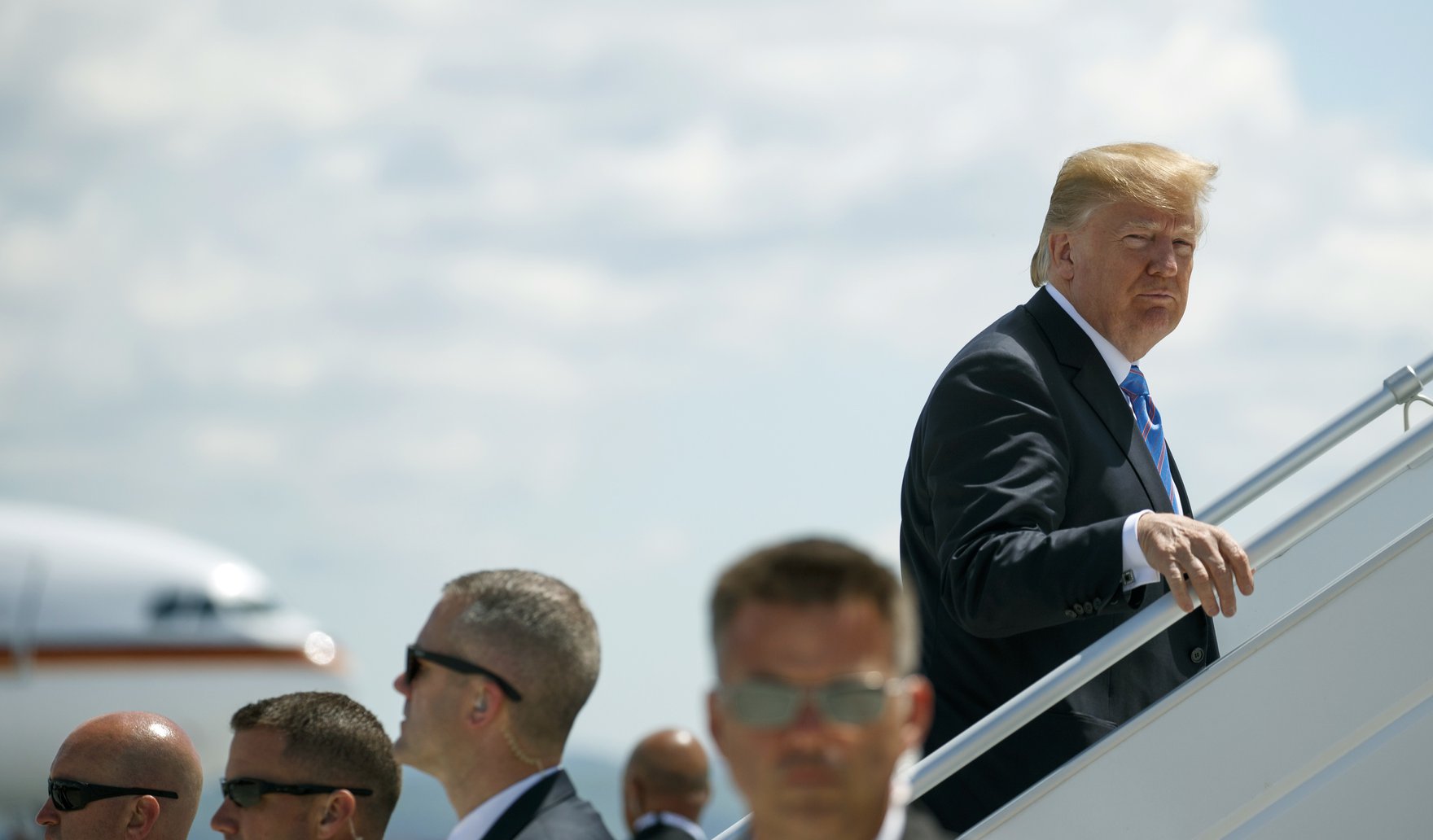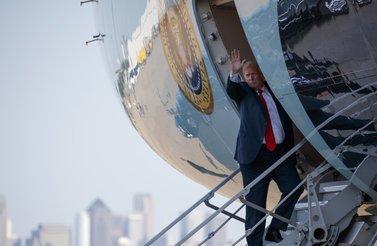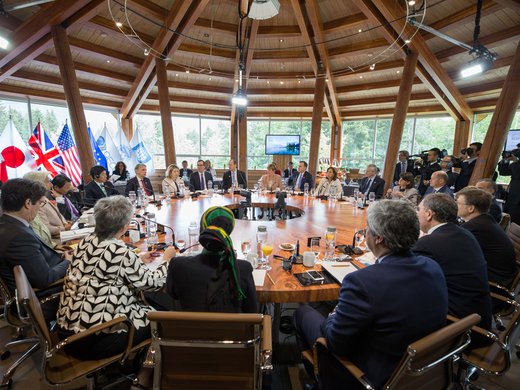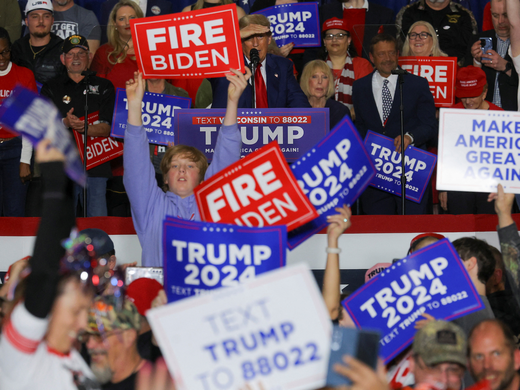A few minutes before 7:00 p.m. local time on June 9, officials published the Group of Seven (G7) communiqué of the Charlevoix Summit.
The document suggested leaders had resolved the testy “G6-plus-one”/“G1-plus-six” dynamic that had taken hold a week earlier when finance ministers from Canada, France, Germany, Italy, Japan and the United Kingdom rounded on their American counterpart in Whistler, British Columbia. The meeting’s chair, Canadian Finance Minister Bill Morneau, isolated the United States in the official summary, saying that the protectionist trade policies of President Donald Trump’s administration had put the G7’s history of “collaboration and cooperation” at risk. Unity within the group had never broken down in such a public way.
Leaders avoided such language, finding a compromise that wove Trump’s particular grievances about trade into the communiqué. “We commit to modernize the WTO [World Trade Organization] to make it more fair as soon as possible,” the official statement on the Charlevoix meeting said. “We strive to reduce tariff barriers, non-tariff barriers and subsidies,” the leaders added, while calling for negotiations “this year” to “develop stronger international rules on market-distorting industrial subsidies and trade-distorting actions by state-owned enterprises.”
The peace didn’t last long.
From the air en route to his upcoming summit in Singapore with North Korea’s leader, Kim Jong-un, Trump published two tweets that shattered whatever consensus had existed when he left Quebec hours earlier. He accused Canadian Prime Minister Justin Trudeau, the host, of issuing “false statements” at a press conference, called Trudeau “dishonest & weak,” and declared that he was pulling his endorsement of the G7 communiqué.
“Based on Justin’s false statements at his news conference, and the fact that Canada is charging massive Tariffs to our U.S. farmers, workers and companies, I have instructed our U.S. Reps not to endorse the Communique as we look at Tariffs on automobiles flooding the U.S. Market!” Trump tweeted from Air Force One.
There’s a lot to talk about after what surely ranks as the most openly rancorous meeting in the four-decade history of the G7. The media was obsessed with the immediate fallout, which is important, but there also is reason to think about the longer term. Has Trump fundamentally damaged the postwar alliance, and if he has, what can be done to keep the current system from breaking down?
First, the short term.
Hopes of bridging differences between Europe and the United States on the future of the Iran nuclear deal were dashed, as the gulf between the two sides widened after Trump’s tweets. French President Emmanuel Macron reacted angrily, saying in a statement that “France and Europe” stood by the commitments endorsed by the G7. “We are sticking to them and whoever reneges on them is showing incoherence and inconsistency,” the statement said.
Canada-US relations have sunk to their lowest point in decades, a concern since the two countries, along with Mexico, are in the middle of a difficult renegotiation of the North American Free Trade Agreement. The events of the weekend will make it harder to agree on a deal because Trump’s attacks on Trudeau will likely make it harder for Canada to make unpopular concessions. Canadian voters have an infamous anti-American streak. Notably, Trudeau’s political opponents were universal in their condemnation of the Trump administration’s treatment of Canada’s leader.
Larry Kudlow and Peter Navarro, two of Trump’s top economic advisers, amplified their boss’s displeasure with Trudeau.
“There’s a special place in hell for any foreign leader that engages in bad faith diplomacy with President Donald J. Trump and then tries to stab him in the back on the way out the door,” Navarro said on Fox News on June 10.
“It was diplomatic betrayal,” Kudlow said on CNN.
Trudeau said that he found the basis for the aluminum and steel tariffs — national security — “insulting,” a line he has been repeating since the United States ended exemptions for the European Union, Canada and Mexico at the end of May. The prime minister also said he would proceed with tit-for-tat duties on American imports on July 1. Kudlow suggested the president was upset because Trudeau’s comments made the United States look weak ahead of Trump’s summit with Kim. Foreign Affairs Minister Chrystia Freeland told reporters that “Canada does not believe ad hominem attacks are a particularly appropriate or useful way to conduct our relations with other countries.”
Beyond the short term, the Charlevoix summit raises questions about future international cooperation and governance. The G7 is diminished, but hardly feeble. It launched the global response to the financial crisis, for example. It is the natural forum to organize an international defence against cyber attacks, since its members possess excellent technical capabilities and still dominate the global financial system.
It is tempting to overreact to the weekend’s events. A story in The New York Times declared that Trump “all but blew up the Group of 7 nations that the United States has led for more than four decades and essentially declared open political war on America’s closest neighbor.”
That could be exaggerating things. In a recent interview, Alan Alexandroff, director of the Global Summitry Project at the University of Toronto’s Munk School of Global Affairs, observed that international institutions rarely disappear. Daniel Schwanen, vice president of research at the C. D. Howe Institute, observed that the G7, which met for the first time in the mid-1970s, is especially “hard to kill.”
But institutions change.
The G7 went from being the steering committee of the global economy to a caucus of industrialized democracies with the Group of Twenty (G20). It could easily be downgraded again, especially if the United States loses interest. The G20 was a secondary forum early in its life; the finance ministers and central bank governors who were its members would often send deputies in their place. It was only after the G20 became a gathering place for leaders that its meetings became can’t-miss events.
This would be an unfortunate time for the G7 to become an afterthought.
The G20 excelled at fighting the Great Recession, but it has struggled to do much since dousing the fires. Trump’s metals tariffs are a response to weak prices caused, mostly, by China’s refusal to curb its highly subsidized production of steel. This has been a problem for years and, in 2016, the G20 resolved to do something about it, setting up a task force aimed at reducing supply. Yet, little has changed.
“Maybe there should have been a stronger sense of urgency,” Christine Lagarde, managing director of the International Monetary Fund, said in an interview on June 2, after I asked her if the G20 could have done more to reduce the steel glut. “The process took quite a bit of time. The political will probably was not there. As institutions, you can try hard, but if there is no political will behind it to address issues, it’s difficult.”
The G7 is actually more relevant now than it has been in years.
The Charlevoix communiqué says the G7 will continue to be guided by “our shared values of freedom, democracy, the rule of law and respect for human rights and our commitment to promote a rules-based international order.” That used to read like boilerplate, but not these days. With countries such as China, Russia and Turkey embracing autocracy and state-sponsored capitalism, the G7 has a new mission as champion of a liberal world order. “It’s not necessarily a bad idea for these people, who can talk to each other frankly, to stick together,” Schwanen said in an interview ahead of the Charlevoix Summit. “It’s a bunch of countries that still has a lot of clout.”
The test will be whether they decide to use it. The G7 called on the G20’s steel initiative — the Global Forum on Steel Excess Capacity — to “fully and promptly implement its recommendations” and stressed an “urgent need to avoid excess capacity in other sectors such as aluminum and high technology.”
Those are worthwhile goals. Correcting such issues would restore the G7’s credibility. If Trump insists on going his own way, the other members of the group should still push for collective agreements on the issues that threaten to wreck the global trading system.
“A lot can be done by focusing on what would serve everybody’s interest,” Lagarde said. “And I’m not excluding China from that process. It cannot be about everybody against another one. It has to be, what will benefit all and what will establish those rules for a level playing field where trade benefits everybody. That would be the ideal end game.”




